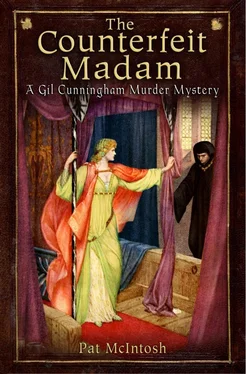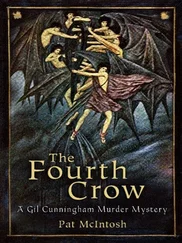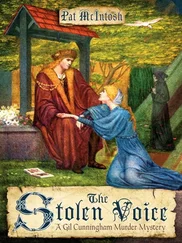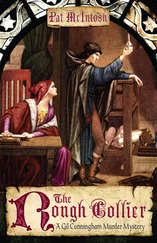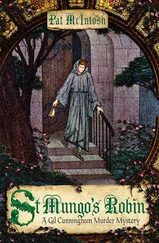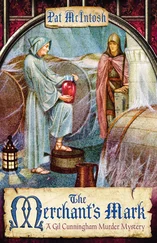Pat McIntosh - The Counterfeit Madam
Здесь есть возможность читать онлайн «Pat McIntosh - The Counterfeit Madam» весь текст электронной книги совершенно бесплатно (целиком полную версию без сокращений). В некоторых случаях можно слушать аудио, скачать через торрент в формате fb2 и присутствует краткое содержание. Жанр: Исторический детектив, на английском языке. Описание произведения, (предисловие) а так же отзывы посетителей доступны на портале библиотеки ЛибКат.
- Название:The Counterfeit Madam
- Автор:
- Жанр:
- Год:неизвестен
- ISBN:нет данных
- Рейтинг книги:4 / 5. Голосов: 1
-
Избранное:Добавить в избранное
- Отзывы:
-
Ваша оценка:
- 80
- 1
- 2
- 3
- 4
- 5
The Counterfeit Madam: краткое содержание, описание и аннотация
Предлагаем к чтению аннотацию, описание, краткое содержание или предисловие (зависит от того, что написал сам автор книги «The Counterfeit Madam»). Если вы не нашли необходимую информацию о книге — напишите в комментариях, мы постараемся отыскать её.
The Counterfeit Madam — читать онлайн бесплатно полную книгу (весь текст) целиком
Ниже представлен текст книги, разбитый по страницам. Система сохранения места последней прочитанной страницы, позволяет с удобством читать онлайн бесплатно книгу «The Counterfeit Madam», без необходимости каждый раз заново искать на чём Вы остановились. Поставьте закладку, и сможете в любой момент перейти на страницу, на которой закончили чтение.
Интервал:
Закладка:
‘What are we looking for?’
‘Aught out o place.’ The lantern’s narrow beam moved slowly round the place. One small room, a workbench at one end, a hearth at the other. The light glinted on a rack of tools, raising a glow from blades of chisel and gouge, casting darkness beyond a mell on the bench, its head as big as Gil’s two fists. Two kists, a rack with papers, a table and two stools, another rack of shelves with kitchen stuff on them, a ladder in the corner leading to a dark loft. The place smelled of damp, of cold ashes, of something else. Socrates left Gil’s side and padded round, sniffing in corners, his paws rasping on the beaten earth floor. The lantern, in Boyd’s hand, moved towards the workbench, the light skimming over a clutter of wood shavings, several gouges, two small-bladed knives. The hearth, when Gil stepped over to it, was cold, though the two crocks washed out and set to drip beside it still had damp patches beneath them. He frowned. Something did not quite fit there.
‘Where’s the work-piece?’ he asked quietly. They were both using the voice a little above a whisper, the pitch least likely to disturb the sleeping neighbours. The light swung across the bench, round the room, dipped to the floor.
‘Here.’ Boyd stooped and came up with a piece of wood, set it among the shavings, held the lantern close. A figure emerged from the cross-lit surface like a corpse out of water, St Paul with book and sword, six inches high.
‘He’s been interrupted,’ Gil said. ‘A craftsman doesny leave his work like that, he makes all tidy and stows his tools. And yet he’s had time to wash the crocks, and not so long since at that.’
‘So where is he?’ wondered Boyd. He was inspecting the bench, and now bent to peer under it, the light showing a shelf with baskets ranged along it. ‘What have we here? Aye, different work, a couple wax medallions, an alabaster waiting to be mended.’ He was pulling the baskets towards him one by one, peering into each. ‘No metalwork. Where does he do his metalwork?’
‘He doesny,’ said Gil. ‘He’s a carver, a maker of figures and pictures.’
‘He does engraving. I’ve seen him. I’d wager it was him made the dies for the coiners. I hoped there might be something in the house to prove it.’ The other man straightened up, and the beam of light flitted round the room again, the shadows dancing away from it. Outside, a child wailed, an adult spoke, and Boyd snapped the shutter of the lantern closed. Darkness choked the little house, and they waited, listening, while the dog snuffled at something. Both mother and child spoke again. Gil, ears at the stretch, breathing quietly, realized that muffled in darkness as he was his other senses were heightened; he was aware of Boyd moving away from the bench, of air stirring past his face, of the smells of damp earth and new timber, ashes and cold meat. Socrates’ strong claws scraped at wood. The child had fallen silent; the strapping of a bed creaked. Sweet St Giles, he thought, you might as well live on the Tolbooth steps.
The lantern opened again, startlingly bright after the thick darkness, and showed Socrates, his nose pressed intently at the lid of one of the kists. Gil, wishing he had a light himself, moved past his dog to the second kist, while Boyd turned his attention to the papers in the rack.
‘Contracts,’ he said after a moment. ‘A St Francis for the Greyfriars, a Philip and James for St Thomas’s. He’s doing well enow.’
‘Clothes in here,’ said Gil. He dug cautiously among the folded garments. ‘Couple of medals, a purse wi a few coins. No metalworking tools that I can feel.’
‘See us the coins,’ requested Boyd. Gil obediently drew the purse out, and his companion took it to the workbench and tipped the contents out into the beam of the lantern. Gil moved to the other kist, elbowed Socrates out of the way and lifted the lid. ‘Two, no, three false ones,’ Boyd reported. Gil grunted, peering at what lay inside, something light and dark in patches which filled the kist to its top -
The lid fell with a bang as he recoiled with a shudder, fell over Socrates, and went down, taking one of the stools with him.
‘You great juffler-’ began Boyd. Outside, the child wailed again, and someone shouted. ‘Quick, bar the door, they’ll be out like a spilled byke-’
Gil scrambled to his feet and collected himself, pulling his doublet straight, patting his apologetic dog. Boyd was making for the door, but he put out a hand and seized the other man’s arm.
‘A moment,’ he said, and drew a slightly shaky breath. ‘I think I’ve found Dod Muir.’
‘ What? ’
There were loud voices in the house across the toft. Someone shouted about a light.
‘In the kist. He’s cold, and softened. I found his face.’ He wiped the other hand on his hose, trying to eliminate the feeling of the clammy flesh. ‘Let’s have some light on him.’
The body in the kist was folded up, knees on chest, head tilted sideways. The face was pale in the thin light, the features flattened by the lid of the chest. The eyes stared at them pleadingly. Socrates inserted his long nose under Gil’s elbow and sniffed curiously at the dead man’s ear, and Boyd said with reluctance,
‘Aye, it’s Muir right enough. How did he die, I wonder?’
‘I can smell blood,’ said Gil, ‘though it’s not fresh.’
‘ Dhia! ’ said a voice above them in horror.
The lantern jerked convulsively, but Socrates looked upwards, ears pricked. Gil followed the dog’s gaze. At the top of the ladder, against the darkness of the loft, a dark-browed face stared back at them, appalled.
‘Christ aid!’ said Boyd. ‘Who the devil are you?’
‘Dod!’ shouted someone outside, and there was a hammering at the door. Socrates scrambled to his feet, head down, growling. ‘Is that you, man? What’s befallen ye? Are ye scaithed?’
‘Euan Campbell,’ said Gil with resignation. ‘Come down out o there.’
‘It iss mysel, no my brother,’ said the man in the loft. ‘I will just be putting my boots on, maybe.’
‘Who’s in there?’ demanded the voice outside.
‘Niall, an tu a tha’ann? ’ A woman’s voice, shrill with anxiety. The child was screaming now. Sandy Boyd calmly handed Gil the lantern and drew his cloak about him in an elaborate gesture. Suddenly, Madam Xanthe was back, simpering in the dimness.
‘I’ll let you deal wi’t, seeing you found him,’ she said archly.
‘My gratitude,’ said Gil with feeling, ‘knows no bounds.’ He opened another shutter on the lantern. The hammering on the door was growing more urgent, and Socrates was growling insistently. ‘Neil! Get down here, man!’
‘You were just wanting somewhere to sleep,’ repeated Otterburn. He stared at Neil Campbell, his expression baffled. Gil sympathized; conversation with the Campbell brothers often left him feeling the same way. ‘So why did you pick Dod Muir’s loft?’
‘My cousin was saying he was from home.’
‘Your cousin being,’ Otterburn referred to his notes, ‘Noll Campbell the whitesmith. Christ on a handcart, I think the whole of Scotland must be kin to the folk on this toft. And how did he ken the man Muir was from home?’
‘But he was not from home,’ the gallowglass pointed out earnestly.
‘What,’ said Otterburn with thinning patience, ‘made your kinsman think Muir was from home?’
‘Well, he was never seeing him all day. And nor was the women.’
‘Hmm,’ said Otterburn, gazing at Campbell in the candlelight. ‘What are you doing here anyway? Why are you in Glasgow the now?’
‘Visiting my cousin,’ said Campbell, innocence shining in his face.
‘So why were you not lodged wi him?’ Gil asked.
Читать дальшеИнтервал:
Закладка:
Похожие книги на «The Counterfeit Madam»
Представляем Вашему вниманию похожие книги на «The Counterfeit Madam» списком для выбора. Мы отобрали схожую по названию и смыслу литературу в надежде предоставить читателям больше вариантов отыскать новые, интересные, ещё непрочитанные произведения.
Обсуждение, отзывы о книге «The Counterfeit Madam» и просто собственные мнения читателей. Оставьте ваши комментарии, напишите, что Вы думаете о произведении, его смысле или главных героях. Укажите что конкретно понравилось, а что нет, и почему Вы так считаете.
